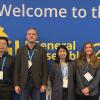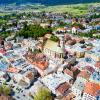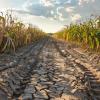
The annual European Geosciences Union (EGU) General Assembly took place from April 14-19, 2024, in Vienna. The FLAM Team participated significantly as conveners, oral presenters, and poster exhibitors in various sessions.
In the Biogeosciences Session, Hyun-Woo Jo presented a study titled “Integrating Human Domain Knowledge into Artificial Intelligence for Hybrid Forest Fire Prediction: Case Studies from South Korea and Italy” which highlighted the adaptability and adjustability of FLAM to accurately predict and analyze forest fire dynamics in South Korea and Italy using Artificial Intelligence coupled with process-based algorithms at various scales. Projections of fire frequency under climate change (CMIP6) scenarios and forest management options were presented.
Additionally, Shelby Corning and Andrey Krasovskiy with colleagues from Italy and Portugal convened a two day session titled: “Spatial and temporal patterns of wildfires: models, theory, and reality,” which aimed to share insights from studies on the understanding of wildfire patterns, post-fire recovery and restoration, and wildfire mitigation strategies by bringing together a diverse group of experts. Participants discussed innovative tools and methods for analyzing and modeling wildfires at various scales, focusing on their spatial-temporal patterns and associated risk factors. Presentations covered global studies, as well as regional studies including projects found across Europe, Asia, the Americas, and Australia.
FLAM team at EGU24
Andrey and Shelby chaired both oral and poster sessions. At the poster session, Johanna San Pedro presented a poster entitled: “Modeling Wildfire Dynamics in Latin America Using the FLAM Framework,” which provided insights into the application of FLAM across Latin American countries, including analysis of historical burned areas for several vegetation classes and future projections under climate change scenarios.
The team had fruitful discussions with a wildfire community and is excited to share more about the model and its advancement at future events. Looking forward, the team will be in IUFRO to be held in Stockholm, Sweden from 23 to 29 June 2024 where they will take advantage of the coming-together of experts and researchers in the field of forestry, wildfire management, and natural hazards and nurture collaborations.
News

11 March 2025
IIASA provides insights on research, technology, and innovation to Austrian federal states

05 March 2025
Co-creating a stakeholder-oriented climate risk service in Austria

25 February 2025

